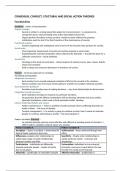CONSENSUS, CONFLICT, STUCTURAL AND SOCIAL ACTION THEORIES
Functionalism
Durkheim – father of functionalism
Organic analogy:
- Society is similar to a living being that adapts to its environment + is comprised on
component parts, each providing some action that helps humans live.
- Organs perform functions to keep up alive, would not exist without this purpose.
- Institutions exist (or don’t) for their function of the maintenance of society.
Functional analysis:
- Involves explaining why institutions exist in terms of the function they perform for society.
Social order:
- Most important requirement of society to function properly is social order.
- Establishing the essential similarities which collective life demands -> provide the basis for a
collective conscience = social solidarity.
Social facts:
- Sociology is the study of social facts – shared aspects of society (norms, laws, values, beliefs,
rituals and customs)
- Exist to shape and constrain behaviour of members of society.
Parsons – structural approach in sociology
Functional prerequisites:
Adaptation (economic) –
- Each society has to provide adequate standard of life for the survival of its members.
- Human societies vary from basic hunter gatherer societies to complex industrial societies.
Goal attainment (political)-
- Societies must develop ways of making decisions, - vary from dictatorships to democracies.
Integration (social harmony)-
- Each institution develops in response to particular functions.
- No guarantee that the different institutions will not develop elements that may conflict.
- Specialist institutions, which seek to limit potential conflict, develop.
Latency (individual beliefs and values)
- Pattern maintenance -> refers to problems faced by people when conflicting demands are
made of them. – the issue of identity
- Tension management -> if a society is going to continue to exist, then it needs to motivate
people to continue and belong to society + not leave/oppose it.
Pattern Variables (Parsons) –
- As societies develop, become more effective and efficient at meeting needs of members, =
shift in pattern variables (cultural values of a society)
Pattern variables A Pattern variables B
Ascription – status is ascribed -> determined by Achievement - status achieved through own
type of family a person is born into effort
Diffuseness -people enter relationships to Specificity – People enter relationships to
satisfy large range of needs. Relationship satisfy particular needs – customer and
between mother and child shopkeeper.
Particularism – individuals act differently Universalism -individuals act on universal
towards particular people – loyalty to family principles, everyone is equal before the law.
but not strangers Female P.O would arrest husband.
Affectivity – gratification is inevitable 0 people Affective Neutrality – gratification is
, act to gratify desires ASAP determined, saving money for a housing
deposit etc.
Collective Orientation – people put interests of Self-Orientation - people pursue own interests
the social groups which they belong before own first, rather than the social group.
interests
Parsons – structural differentiation
- Cultures become more structurally complex as society evolves.
- Simple societies rely on 2 institutions to carry out most functions (religion and family)
- Modern industrial societies develop new + more efficient specialist institutions.
- Schools, colleges, and uni does education instead of family.
- Welfare state takes over caring roles of family + churches.
Marxism
Marx ->
Development of society through historical epochs:
- Primitive communism, slave economy, feudal economy, capitalism, communism.
Mode of production-
- A complete economic and social system based on a different way of organising the
production of goods.
- Primitive communism – production based on hunting/gathering because there is no surplus
to accumulate, no social classes.
- All subsequent modes of production – society + production based on exploitation of one
class by another (Historical materialism), Feudalism – the feudal lords exploit serts who have
to surrender some of their produce to their masters, in capitalism, capitalists exploit the WC.
Social class-
- Some people are able to gain ownership + control over means of production.
- Land, raw materials, machinery, labour power and capital.
- In non-communist society, one class owns MOP, while other class is forced to work for them
as no means to create wealth themselves.
Economic base-
- Means of production and the class system (Relations of production)
- Ruling class own the means of production – constructs whole set of social relationships that
benefit them and allow them to exploit all others who do not share ownership of MOP.
Inevitable end of an epoch-
- Means of production develop faster than values of RC -> within each epoch, at the beginning
– RC values help tech to move forward. Overtime, values do not move that fast and begin to
get in way, eventually impede it.
- New challenging group arises with values/ideas that help the MOP advance + after a degree
of conflict, gain control of society + construct own relations of production, new epoch
started and process begins again.
The capitalist model:
Bourgeoise, Proletariat and petit bourgeoise-
- Bourgeoise -> own industry and commerce, all others who work for a wage, no matter the
prestige are proletariat.




